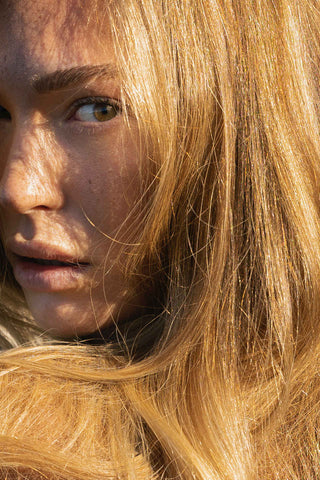Have you ever heard about hard water and been confused by what it truly means? When we refer to hard water, we’re not actually talking about how it feels or the density of the water. Hard water is water that has a high volume of hard minerals including magnesium and calcium and metals such as lead, iron and copper. The more traces of minerals and metals found in water, the “harder” it is considered to be.
According to estimates, Australian water suppliers can add up to 50 pollutants and close to 2000 if by-products are taken into account. If you have ever travelled overseas and found your hair has suffered from shower water, this is because some International water supplies contain a lot more minerals and metals than Australia.
Whilst hard water does not pose any danger to the safety of our water, it can negatively affect our hair in more ways that one. Never fear, we are here to educate you on how to eliminate the effects of hard water on both your hair and skin.
Effects Of Hard Water On Hair

Hard water coats your hair with a mineral film. This leaves your hair feeling straw-like, dry, grimey, flat and lifeless. It can weigh down curls, causing your hair to look limp and dull. Naturally, we then wash our hair more often, spend money on expensive products and treatments, when in fact we are only making the problem worse.
An exaggerated example of what hard water can do to your hair is how dry and crunchy it feels when you let it air dry after swimming in the ocean. The mineral residue, in this example sodium, though at a higher concentration than in typical domestic water, is what gives your hair that crunchy feeling when the water evaporates. Tap water minerals behave similarly. Hard water minerals can seep into wet hair strands and solidify as the hair dries. The crystallisation leaves a deposit on your hair that keeps moisture from entering or leaving it. This results in hair that is more prone to breakage and tangling, along with dullness and dehydration.
Exposure to hard water also changes the tones of blondes. Ever left the salon feeling amazing about your new colour and notice your colour turn copper, gold or brassy in a matter of washes? This is the iron in hard water depositing on your hair, causing discolouration and fade age.
Effects Of Hard Water On Skin

Hard water deposits minerals on the skin, which can cause a variety of skin issues, such as dryness and inflammation. Since hard water contains a lot of calcium, soap also won’t dissolve properly or entirely, leaving a coating on your skin. This may cause inflammation that leads to dermatitis, acne, clogged pores, and early ageing. This also means that your expensive skincare products won't be work as they should due to the inability to penetrate the skin.
Ways To Prevent Hard Water Damage
Whilst we can’t help where our water comes from, you can rest assured there are a few steps you can take to minimise the effects of hard water damage:
1. Purchase a Filtered Beauty Shower Purifier
The Filtered Beauty Shower Purifier has a 15-stage filtration system. Not only does it filter out the toxins and chemicals, but it also infuses your water with beneficial minerals and Vitamin C. You will quickly notice your hair and skin feeling more hydrated, longer lasting colour vibrancy and volume to your hair.
Ultimately, you are removing lead, copper, chlorine, aluminium, mercury, heavy metals and more from your shower water.

2. Incorporate a Pre-Shampoo Treatment Into Your Routine
3. Use a Clarifying or Chelating Shampoo
If your home utilises or your travelling to a country known for it’s hard water, we recommend a chelating shampoo to use once a week within your hair care routine. The K18 Detox Shampoo contains chelating agents that bind with metals and minerals in water to then be rinsed away. This non-stripping Shampoo reduces copper build up by up to 76% in just one wash and tackles other common metals including Nickel. Lead and Zinc. It’s important to note that chelating agents can be irritating, so something like this would be a great once-a-week product, followed with an intense hydrating treatment.
4. Reverse the ph Balance with an Acidic Rinse
Acidic ingredients work well to reverse the pH imbalance from hard water damage. Apple Cider Vinegar is a great example and a popular miracle ingredient added to hair products due to it's ability to cleanse and and remove build up whilst boosting shine. R+Co’s Acid Wash cleanses away mineral buildup without stripping away natural oils or colour. This clarifying rinse helps maintain the pH balance of the hair, leaving it softened and with a dramatic shine. Apple Fruit Extract, protects hair and scalp from damage and acts as a natural exfoliant. Aloe Vera Leaf Juice and Tamanu Seed Oil adds strength, seals in moisture and restores vitality to dull hair.

